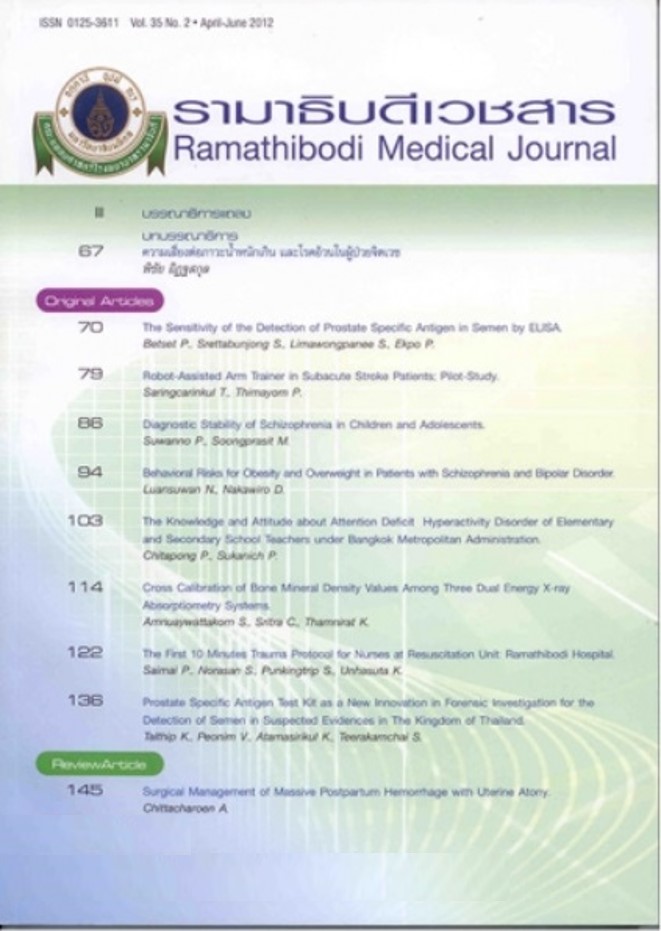The Knowledge and Attitude about Attention Deficit Hyperactivity Disorder of Elementary and Secondary School Teachers under Bangkok Metropolitan Administration
Keywords:
Attention deficit-hyperactivity disorder, ADHD, Teacher’s knowledge, Teaches attitudeAbstract
Background: Attention-Deficit/ Hyperactivity Disorder (ADHD) is a common child psychiatric disorder that has a negative impact not only to the children per se but also to their families and schools. Teachers play an important role in detecting, referring the children to the medical services and also taking care of the success of the students in schools.
Objective: To develop an instrument to measure teacher’s knowledge and attitude in ADHD and to identify factors that influence those two mentioned teacher’s aspects.
Methods: This cross sectional study included 400 Bangkok teachers which were randomly sampling. The instrument used consists of the 25-items knowledge part (both biological and psychosocial) and the 20-items attitude part.
Results: The instrument was validated and then reedited by the specialists. It is reliability on knowledge and attitude were 0.389 and 0.750 respectively. For the knowledge part, the female teachers had a higher score than the male ones, not depending on the grades they were teaching. The younger the teachers are, the higher score they had. The correlation was found between the number of hours they teach the ADHD and the better knowledge about the disorder. The prior training course on ADHD also relates to the teacher’s higher score on both parts. However, most of the teachers did better on the psychosocial knowledge. For the attitude part, sex, grade they were teaching, number of teaching hours were not different in their score among groups. The order and the never teach groups yield higher attitude scores. The knowledge inversely correlated with the attitude.
Conclusion: Measurement was quite good to use and knowledge inversely correlated with attitude.
References
Lacramioara SL, Eugene A. Attention-Deficit/ Hyperactivity disorder. In: Andres M, Fred RV, eds. Lewis’s Child and Adolescent Psychiatry: A Comprehensive Textbook. 4th ed. Philadelphia: Lippincott Williams & Wilkins; 2007:430-49.
Brook U, Watemberg N, Geva D. Attitude and knowledge of attention deficit hyperactivity disorder and learning disability among high school teachers. Patient Educ Couns. 2000;40(3):247-52. doi:10.1016/S0738-3991(99)00080-4.
Ghanizadeh A, Bahredar MJ, Moeini SR. Knowledge and attitudes towards attention deficit hyperactivity disorder among elementary school teachers. Patient Educ Couns. 2006;63(1-2):84-8. doi:10.1016/j.pec.2005.09.002.
Kawagoe K. Teachers’ Knowledge and Attitudes Concerning Children with Attention Deficit Hyperactivity Disorder [Master thesis]. California State University; 2006.
Jerome L, Washington P, Laine CJ, Segal A. Is teacher's knowledge regarding Attention-Deficit/Hyperactivity Disorder (ADHD) improving? Child and Adolescent Psychiatry On-Line; 1999. https://www.priory.com/psych/adhdteach.htm. Published September 9, 1999. Accessed October 10, 2010.
Bekle B. Knowledge and attitudes about attention-deficit hyperactivity disorder (ADHD): a comparison between practicing teachers and undergraduate education students. J Atten Disord. 2004;7(3):151-61. doi:10.1177/108705470400700303.
Kos, J. Primary School Teachers' Knowledge, Attitudes and Behaviours toward Children with Attention-Deficit/Hyperactivity Disorder [Master thesis]. RMIT University; 2004. https://www.semanticscholar.org/paper/Primary-school-teachers'-knowledge%2C-attitudes-and-Kos/e535f7f2f1b9ff965865c7bf042b4955b645ce36.
D’Ausilio CB. Sources of Information and Selected Variables and Their Relationship to Teachers' Knowledge and Attitudes Regarding Attention Deficit Hyperactivity Disorder (ADHD) [Dissertation]. Florida Atlantic University; 2005. https://fau.digital.flvc.org/islandora/object/fau%3A9086.
Policy and Planning Group, Department of Education. https://203.155.220.118/info/stat_search/stat_53/edu53_01.htm. Published 2009. Accessed August 25, 2011.
Yamane T. Statistics: An Introductory Analysis. 2nd ed. New York: Harper & Row; 1973:110-25.
Bloom BS. Taxonomy of Educational Objectives, Handbook I: The Cognitive Domain. New York: David McKay; 1956. https://www.uky.edu/~rsand1/china2018/texts/Bloom%20et%20al%20-Taxonomy%20of%20Educational%20Objectives.pdf.
Hannah ME, Pliner S. Teacher attitudes toward handicapped children: a review and synthesis. Sch Psychol Rev. 1983;12(1):12-25.
Office of Education Reform, Ministry of Education. Guidelines for Educational Reform. Bangkok, Pimdee Co., Ltd.; 2002.
Policy and Planning Group, Department of Education. Statistics Education, 2010. https://www.bmaeducation.in.th/download/teacher53.xls. Accessed October 31, 2011.













